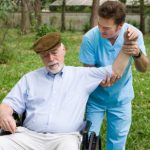Adult day care is becoming a much more utilized service. With nursing home abuse stories widespread and  costs of assisted living and nursing homes high and largely unpaid by Medicaid and Medicare, keeping elderly relatives at home is a much more viable alternative. If the relative is unable to complete many daily activities or has a strong possibility of causing injury or danger if unattended, adult day care may be necessary to allow the primary caregiver to work and complete errands.
costs of assisted living and nursing homes high and largely unpaid by Medicaid and Medicare, keeping elderly relatives at home is a much more viable alternative. If the relative is unable to complete many daily activities or has a strong possibility of causing injury or danger if unattended, adult day care may be necessary to allow the primary caregiver to work and complete errands.
Adult day care is usually located in a facility that can provide medical help if necessary, and accommodations are similar to nursing home accommodations. In some cases, adult day care is held inside of nursing homes. Care givers can leave handicapped loved ones at the adult day care for a specified number of hours. In some cases, Medicaid or veteran’s assistance programs can assist with costs. Unfortunately, adult day care abuse is on the rise.
Types of Adult day Care Abuse
Nearly all of the types of abuse that are present in nursing homes are also present in adult day care centers. Patients that cannot communicate effectively may not be able to tell loved ones that adult day care abuse is happening, so loved ones must watch for signs. Since the day care is short term as opposed to long term care, signs of abuse may be easier to detect than with live-in nursing home situations.
Physical Abuse
Physical abuse is easier to spot than other forms of adult day care abuse, as there is usually some kind of mark from the abuse. Loved ones should be sure to ask about any new bruises or cuts when picking patients up for the day. Communicating frequently with managers and staff present at the center is necessary to prevent adult day care center abuse.
Sexual Abuse
Any form of unwanted touch or inappropriate gestures or jokes can be considered sexual abuse. Sexual abuse is more difficult to spot than physical abuse. Patients may have bruises or marks in private areas that can alert loved ones to the abuse. In some cases the signs can be more subtle, such as a change in emotional state or withdrawal from normal activities.
Verbal Abuse
Adult day care abuse that is being carried out verbally can have detrimental effects of the patient’s mental and emotional state. While this type of abuse is somewhat harder to spot, changes in behavior and a more negative perspective can be warning signs. Being fearful or apprehensive about going to the day care can also be signs of adult day care abuse.
Financial Abuse
Stealing patient’s property or asking patients to write checks so that workers can use the checks for personal items are examples of financial abuse. Patients that suffer from a mental impairment should not be given expensive electronics or lots of extra cash to take into the center, as it may put individuals at risk of becoming a target for employees that are less than honest.
How to Prevent or Handle Adult Day Care Abuse
Loved ones can prevent adult day care abuse by being alert for signs of abuse. Speaking to workers to ascertain character and level of compassion for patients is suggested. If utilizing services on a recurring basis, speaking to regular employees frequently can help to minimize chances of missing signs of abuse, and keep loved ones aware of daily activities and occurrences.
If adult day care abuse is suspected, the patient should not be put into a situation where the abuse can continue any further. A different adult day care may have to be found, or different arrangements made for daily care. If medical care is needed to treat symptoms of adult day care abuse, get the help that is necessary. After stopping and treating the abuse, an attorney should be contacted to discuss legal rights. An attorney may be able to prevent the center that is at fault from being allowed to commit further incidents of adult day care abuse.
Sources:
“Adult Care Facilities.” Department of Healt: Information for a Healthy New york. Department of Health, n.d. Web. 8 Sep 2013. <http://www.health.ny.gov/facilities/adult_care/>.
“Adult Day Care.” AgingCare.com. AgingCare, LLC, n.d. Web. 8 Sep 2013. <http://www.agingcare.com/local/Adult-Day-Care>.
“Adult Day Care.” Eldercare Locator. Administration on Aging, 13 Apr 2012. Web. 8 Sep 2013. <http://www.eldercare.gov/ELDERCARE.NET/Public/Resources/Factsheets/Adult_Day_Care.aspx
